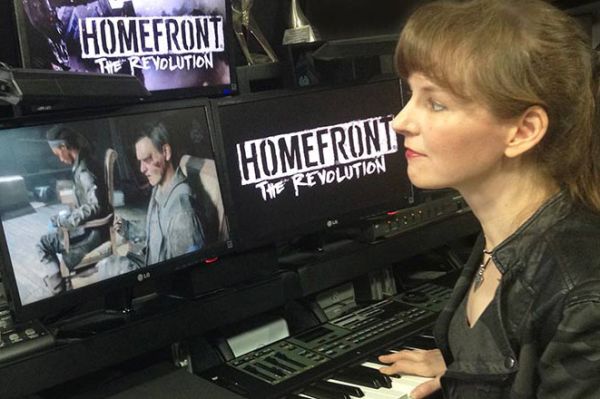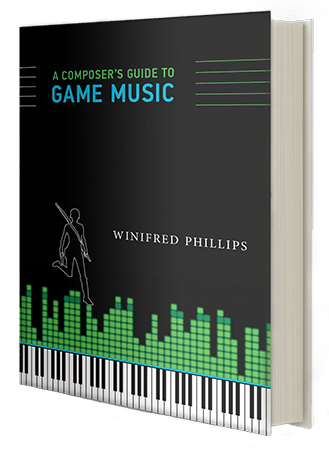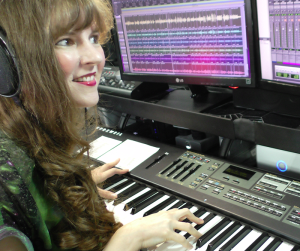Trending
Opinion: How will Project 2025 impact game developers?
The Heritage Foundation's manifesto for the possible next administration could do great harm to many, including large portions of the game development community.

Featured Blog | This community-written post highlights the best of what the game industry has to offer. Read more like it on the Game Developer Blogs or learn how to Submit Your Own Blog Post
This article offers tips for how to break in and establish a career as a game composer, including personal anecdotes on breaking into the industry, strategies for effective career networking, and advice for communicating with development teams.

 As a video game composer and author of the book A Composer's Guide to Game Music, I'm frequently asked for advice on how a young composer can gain entry into this business. I dedicated a chapter of my book to this topic (Chapter 14: Acting Like a Business and Finding Work), so I've certainly thought a great deal about the issue. From my very first project (God of War) all the way to my most recent game (Homefront The Revolution, pictured right), one thing has always been abundantly clear: landing gigs can be a complex journey. That's especially true for newcomers, and there are no easy signposts pointing the way. While I tried to use my own experiences and insights to provide useful guidance in my book, I know that everyone's experience is different, and multiple points of view can be very helpful. So in this article, I'll be offering resources from articles and community discussions on how to face down the awesome challenges of breaking into the industry as a composer of music for games.
As a video game composer and author of the book A Composer's Guide to Game Music, I'm frequently asked for advice on how a young composer can gain entry into this business. I dedicated a chapter of my book to this topic (Chapter 14: Acting Like a Business and Finding Work), so I've certainly thought a great deal about the issue. From my very first project (God of War) all the way to my most recent game (Homefront The Revolution, pictured right), one thing has always been abundantly clear: landing gigs can be a complex journey. That's especially true for newcomers, and there are no easy signposts pointing the way. While I tried to use my own experiences and insights to provide useful guidance in my book, I know that everyone's experience is different, and multiple points of view can be very helpful. So in this article, I'll be offering resources from articles and community discussions on how to face down the awesome challenges of breaking into the industry as a composer of music for games.
First, I'll be sharing a video from my presentation at the Society of Composers and Lyricists seminar, in which I answered the question about how I got my start in the games industry. Then, we'll be exploring highlights from a collection of online articles that offer helpful tips for how to break in and establish a career as a game composer. Finally, at the end of this article I'll be including a full list of links for further reading and reference.
I'm often approached by young composers asking me how I got my start in the video game industry. Since we'll be looking at the experiences and viewpoints of lots of other game audio pros in this article, I thought I should include my own "how I got my start" story. While my story is not particularly typical, it does illustrate the role of networking and personal relationships in a game composer's life. The same business principles that helped me land my first job have continued to support my career. So here's that video from the Society of Composers and Lyricists seminar, in which I tell my unusual story of how I got my start as a game composer:
Well, that's my personal story, so now let's widen our perspective by getting some viewpoints from other professionals in the industry!
 Almost every article and discussion I've encountered about breaking into the game industry will inevitably stress the vital importance of networking. "Networking & contacts is pretty much everything, says composer Chris Hurn in an interesting thread from the community discussion forum Northern Sounds. "This is universal to both films and video games. It's important to be good at what you do, and have a certain style going on, but you can be the best composer in the world and have no gigs if you're not networking with the right people."
Almost every article and discussion I've encountered about breaking into the game industry will inevitably stress the vital importance of networking. "Networking & contacts is pretty much everything, says composer Chris Hurn in an interesting thread from the community discussion forum Northern Sounds. "This is universal to both films and video games. It's important to be good at what you do, and have a certain style going on, but you can be the best composer in the world and have no gigs if you're not networking with the right people."
One of the ways that we can network with the right people is to put ourselves in the right place at the right time, according to game composer Bobby Prince. "Go to the GDC (Game Developer's Conference)," Prince suggests in his article on BPMusic.com, adding that we should try to position ourselves in popular areas during the conference and stay alert. "Keep your eyes and ears open for an opportunity," Prince says. "You don't have to force an opportunity -- the best ones will come to you without effort from you."
While famous events such as GDC are useful, we should remember that this type of networking doesn't have to be limited to face-to-face interaction. The moderator of the Reddit GameAudioPros community elaborates on this idea in an interesting community thread in which online networking is folded into the discussion. "This business really is a matter of tenacity and networking," moderator mockingquantum tells us. "Over time, people will start putting a face (or at least an internet presence and personality) to your name, and once you've established that connection with them, they're much more likely to think of you when work is available."
 While attending top conferences and reaching out to popular online communities can be helpful, there are many other options that facilitate networking and elevate a budding composers visibility. Composer/sound designer Nathan Madsen of Bee Cave Games enumerates these various options in an article for GameAudio101. "Speaking at conferences, taking part in online forums and communities, entering contests, writing tutorials, books and articles, conducting polls, announcing released game projects, sharing audio projects that are outside of the game industry (such as films, CDs, etc) are all ways to have exposure."
While attending top conferences and reaching out to popular online communities can be helpful, there are many other options that facilitate networking and elevate a budding composers visibility. Composer/sound designer Nathan Madsen of Bee Cave Games enumerates these various options in an article for GameAudio101. "Speaking at conferences, taking part in online forums and communities, entering contests, writing tutorials, books and articles, conducting polls, announcing released game projects, sharing audio projects that are outside of the game industry (such as films, CDs, etc) are all ways to have exposure."
While all of these avenues are viable and can be powerful tools, we can also take a much simpler approach. "My personal experience successfully networking in game audio is to simply make friends with people," advises audio director Will Morton in an article for Gamasutra. "People like to work with people that they are not only familiar with but that they personally like, and if two people with identical skills applied for a job it's going to be the person who is most liked that is hired."
So, how can we become "the person who is most liked?" Composer/instructor Lance Hayes offers a few suggestions in an informative blog article. "Smile, be nice, respectful and patient." Hayes also warns that sometimes the process of making friendships can be a long-term investment with delayed rewards. "You may get to know someone today that will be a decider tomorrow or next year," Hayes tells us. "You may get to know someone that has the power to eventually hire you but that takes a little time."
In the end, the process of making friends may hinge on our own personal generosity. Sound designer Akash Thakkar calls this "adding value," which includes everything from sharing information without strings attached to spending time and being a great listener. "What do I mean by 'adding value'?" Thrakkar asks in his short informational video. "It could be anything from asking great questions to making someone smile." Thakkar stresses that "adding value can make all the difference in the world in this industry, because it's so tightly knit and is really all about making friends."
Before we move on from this discussion of networking, I'd like to share a short quote from my book, A Composer's Guide to Game Music:
 "The most fulfilling experience can be found in the simple act of enjoying face-to-face meetings with human beings. As a high-tech industry, video game development has embraced every application and device that facilitates collaboration across distances. We e-mail, voice chat, instant message, and video conference. We send materials to each other via FTP and online media share services. With all these tools at our disposal, we can work successfully in the video game industry without ever setting eyes on our coworkers. Even so, our professional lives can be much richer when we connect with each other on a personal level. Making the pilgrimage to annual industry gatherings such as E3 in Los Angeles and the Game Developers Conference in San Francisco allows us to get to know each other and helps us to feel more connected to our community." A Composer's Guide to Game Music, page 247.
"The most fulfilling experience can be found in the simple act of enjoying face-to-face meetings with human beings. As a high-tech industry, video game development has embraced every application and device that facilitates collaboration across distances. We e-mail, voice chat, instant message, and video conference. We send materials to each other via FTP and online media share services. With all these tools at our disposal, we can work successfully in the video game industry without ever setting eyes on our coworkers. Even so, our professional lives can be much richer when we connect with each other on a personal level. Making the pilgrimage to annual industry gatherings such as E3 in Los Angeles and the Game Developers Conference in San Francisco allows us to get to know each other and helps us to feel more connected to our community." A Composer's Guide to Game Music, page 247.
So, we've talked about the importance of networking well and expanding our sphere of interpersonal influence in the game audio community. So, what happens after that? How do we translate that influence into paying gigs?
 In a GameDev.net discussion thread on finding work as a game composer, user Mirrored suggests, "Start to gain experience with game mod teams. There will be plenty of projects that will eventually get cancelled or put on hold because of various reasons," Mirrored warns, but then adds that "you can build some nice portfolio with the projects you were involved with. And when you feel you are making music at an appropriate level - it will be the time to take your skills to the next level - the commercial one."
In a GameDev.net discussion thread on finding work as a game composer, user Mirrored suggests, "Start to gain experience with game mod teams. There will be plenty of projects that will eventually get cancelled or put on hold because of various reasons," Mirrored warns, but then adds that "you can build some nice portfolio with the projects you were involved with. And when you feel you are making music at an appropriate level - it will be the time to take your skills to the next level - the commercial one."
Making the transition to commercial success can be a rocky road, according to game composer Laura Shigihara in her talk at GDC 2011. "I have a number of friends who spend 100% of their efforts sending demo CDs to large game companies in hopes of getting noticed by the audio directors there. While it's good to send out your demos to these companies, it shouldn't be the only thing you do. These jobs make up only a small fraction of the available jobs out there." Shigihara suggests that we look at alternate markets for our future job opportunities. "The majority of work for game composers is actually found in casual, mobile, social, and indie games, so you should make sure to look for work there, too."
Composer James Hannigan cautions that a realistic outlook and some honest introspection might be required before we are able to find success. "Stay objective about the quality of your music and of your true chances in the sector you're trying to work in, but combine that with enough self-belief to keep you going when you fail or experience rejection," Hannigan says in an interview for GamesRadar. "You'll need a lot of resilience and, unless very lucky, will need to work very hard."
 Besides hard work and perseverance, we will also need to offer something distinctly different and original to our prospective clients, according to Brian Schmidt, the executive director of GameSoundCon. "Establish your own voice and style," urges Schmidt in an article for Sound On Sound. "To make you and your demo stand out, present something unique that really shows who you are as a composer."
Besides hard work and perseverance, we will also need to offer something distinctly different and original to our prospective clients, according to Brian Schmidt, the executive director of GameSoundCon. "Establish your own voice and style," urges Schmidt in an article for Sound On Sound. "To make you and your demo stand out, present something unique that really shows who you are as a composer."
While it's important for us to believe in ourselves and offer music that represents personal expression and originality, we must also be ready to adapt our own expert vision to the needs of the project and the artistic tastes of our prospective clients, according to composer Nelson Everhart. "Working with other creative people sometimes means you have to work the way they want you to work," Everhart observes in an article for the KingsIsle Blog. "Ideally, this matches up with how you’d be doing things anyway, but sometimes it doesn’t. Artists often get the reputation of being ego maniacs, but if you can learn to work with other people’s ideas, more people will be eager to work with you."
Finally, let's end the discussion with an observation from indie game developer Craig Stern, who offers this advice for fledgling game composers in a discussion thread on the TIGForums: "Have a couple of games you can point to where you did the music, where you did an amazing job creating something unique and memorable and professional," Stern says. "If you have that and you're easy to work with, I couldn't care less whether I heard of you via word of mouth, or whether you cold-called my cell phone at 2 in the morning."
So now here's the full list of links to the articles quoted above. I hope you'll find some useful guidance and encouragement in the viewpoints of these game audio professionals. Please let me know what you think in the comments, and feel free to include links to other similar articles in your comments below!
Make Some Noise! Getting a Job Creating Sound and Music for Videogames
by Will Morton, Gamasutra.com
How did you get your first job?
GameAudio Reddit Community Discussion
Finding a game industry job - networking and adding value
by Akash Thakkar, YouTube
Getting Started as a Video Game Composer
by Bobby Prince, BPmusic.com
Where does an amateur composer find job, or is he heard?
Northern Sounds community discussion
Pursuing a Career in Game Audio
by Nathan Madsen, GameAudio101
How to Wrangle a Job Writing Music for Computer Games
by Lance Hayes, Andertons Music Co.
GDC 2011 Talks #1: Tips for Prospective Video Game Composers
by Laura Shigihara, SuperShigi.com
How to get a gig as a Game Music composer
by Brian Schmidt, Sound On Sound
How to be a video game music composer – Tips from the pros
by Sophia Tong, GamesRadar.com
Music in the Gaming Industry – Getting a Job as a Game Composer
by Nelson Everhart, Kingsisle Blog
I want to be a game composer
GameDev.net community discussion
Game Developers and Music Composers – How do you network?
TIGForums community discussion
 Winifred Phillips is an award-winning video game music composer whose most recent project is the triple-A first person shooter Homefront: The Revolution. Her credits include five of the most famous and popular franchises in video gaming: Assassin’s Creed, LittleBigPlanet, Total War, God of War, and The Sims. She is the author of the award-winning bestseller A COMPOSER'S GUIDE TO GAME MUSIC, published by the Massachusetts Institute of Technology Press. As a VR game music expert, she writes frequently on the future of music in virtual reality video games.
Winifred Phillips is an award-winning video game music composer whose most recent project is the triple-A first person shooter Homefront: The Revolution. Her credits include five of the most famous and popular franchises in video gaming: Assassin’s Creed, LittleBigPlanet, Total War, God of War, and The Sims. She is the author of the award-winning bestseller A COMPOSER'S GUIDE TO GAME MUSIC, published by the Massachusetts Institute of Technology Press. As a VR game music expert, she writes frequently on the future of music in virtual reality video games.
Follow her on Twitter @winphillips.
Read more about:
Featured BlogsYou May Also Like